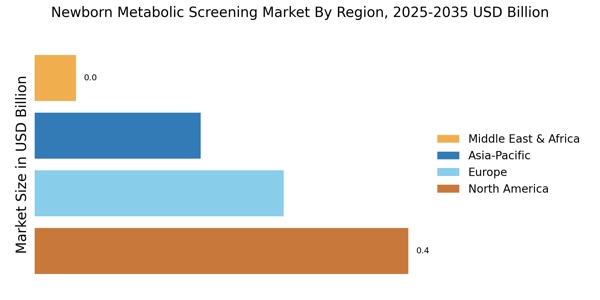Regulatory Support and Guidelines
Regulatory support plays a pivotal role in shaping the Newborn Metabolic Screening Market. Governments and health organizations are establishing comprehensive guidelines that mandate newborn screening for various metabolic disorders. For instance, the implementation of the Recommended Uniform Screening Panel (RUSP) in several regions has expanded the list of conditions that must be screened at birth. This regulatory framework not only ensures that newborns receive essential screenings but also promotes uniformity in testing practices across healthcare facilities. As a result, the market is likely to witness an increase in the number of newborns screened, contributing to improved health outcomes. The emphasis on regulatory compliance is expected to drive investments in screening technologies and infrastructure, further propelling the growth of the Newborn Metabolic Screening Market.
Rising Incidence of Metabolic Disorders
The rising incidence of metabolic disorders is a critical driver for the Newborn Metabolic Screening Market. Studies indicate that the prevalence of conditions such as phenylketonuria and congenital hypothyroidism is increasing, necessitating comprehensive screening programs. As more cases are identified, the demand for effective screening solutions is expected to rise correspondingly. This trend is further supported by advancements in diagnostic technologies that enable the detection of these disorders at an early stage. The market is projected to grow as healthcare systems recognize the importance of early intervention in managing metabolic disorders, which can significantly improve long-term health outcomes for affected individuals. Consequently, the Newborn Metabolic Screening Market is likely to expand in response to this growing public health concern.
Integration of Telehealth in Screening Programs
The integration of telehealth services into newborn metabolic screening programs is emerging as a transformative driver in the Newborn Metabolic Screening Market. Telehealth facilitates remote consultations and follow-ups, making it easier for families to access screening services, especially in underserved areas. This approach not only enhances convenience but also ensures that more newborns receive timely screenings, which is crucial for early diagnosis and treatment. The COVID-19 pandemic has accelerated the adoption of telehealth, and this trend appears to be continuing as healthcare providers recognize its benefits. As telehealth becomes more entrenched in healthcare delivery, the Newborn Metabolic Screening Market is likely to see increased participation and engagement from families, ultimately leading to better health outcomes for newborns.
Technological Advancements in Screening Methods
The Newborn Metabolic Screening Market is experiencing a surge in technological advancements that enhance screening methods. Innovations such as tandem mass spectrometry and genetic testing are becoming more prevalent, allowing for the detection of a wider array of metabolic disorders. These technologies not only improve the accuracy of diagnoses but also reduce the time required for results, which is crucial for timely interventions. As a result, healthcare providers are increasingly adopting these advanced screening techniques, leading to a projected growth rate of approximately 10% annually in the market. The integration of artificial intelligence in data analysis further streamlines the screening process, making it more efficient and reliable. This trend indicates a promising future for the Newborn Metabolic Screening Market, as technology continues to evolve and improve the quality of care for newborns.
Increased Awareness Among Parents and Healthcare Providers
There is a notable increase in awareness regarding the importance of newborn metabolic screening among parents and healthcare providers. Educational campaigns and outreach programs are effectively disseminating information about the benefits of early detection of metabolic disorders. This heightened awareness is leading to a greater demand for screening services, as parents are more inclined to ensure their newborns undergo necessary tests. According to recent surveys, approximately 80% of parents now recognize the significance of metabolic screening, which is a substantial increase compared to previous years. This trend is likely to bolster the Newborn Metabolic Screening Market, as more families seek out screening options and healthcare providers prioritize these essential services in their practice.

















